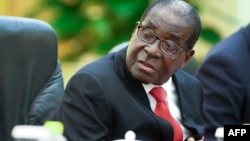The Zimbabwe Human Rights NGO Forum and the Research and Advocacy Unit are warning the nation that the demise of the head of state will trigger a bitter succession fight that might tear the country apart.
In a report titled “The mortal remains: Succession and the Zanu-PF body politic”, the two groups say despite claims from Zanu PF functionaries that the party constitution contains clear succession procedures, all the necessary ingredients “are present for singular unpleasantness upon the demise of the head of state.”
The groups say President Robert Mugabe is probably something of which he is all too aware. They argue that is it is likely that he may seek to guide the process of his succession while he is still able. The report though is quick to add that his difficulty is to do so without the party tearing itself apart in the process.
The report shows that nominations to the Zanu PF presidium have, to date, been determined, in the face of considerable resistance, by a process of “guided democracy” on instructions issued by a politburo-controlled by Mugabe.
They point to the elevation of Vice President Joice Mujuru which was been met with stiff resistance by the faction backing her rival Justice Minister Emmerson Mnangagwa resulting in some members being suspended after attending the Tsholotsho meeting to torpedo Mujuru.
GUIDED DEMOCRACY
The report indicates that nominations to the ZANU PF Presidium have, to date, been determined, in the face of considerable resistance, by a process of “guided democracy” on instructions issued by a Politburo controlled by Mugabe.
The report though poses a crucial question as to what will happen when the post to be filled is that of the “guide” – Mr. Mugabe himself. It says several scenarios suggest themselves, based on the previous manifestations of ZANU PF “internal democratic” practice.
The first is that the “Mnangagwa-faction” may seek to reinvigorate, activate and enforce the democratic processes in the ZANU-PF Constitution. These very processes, the report says, have been altered significantly by Mr. Mugabe, who moved a constitutional amendment to change the Provincial Electoral Colleges from the 44 member Provincial Executive Committee to the 100 plus Provincial Coordinating Committees (PCC) to facilitate Mujuru’s ascendancy.
But the report notes that, this juristic approach may fail in the face of disputes concerning the composition of the PCCs. The groups say costs and logistical difficulties of bringing such a large number of delegates together, should the body be required to convene on short notice, may also present difficulties.
Following nominations by the PCCs, the Zanu-PF constitution says an elaborate process of endorsement by the National People’s Conference and “election” by Congress may need to take place. All will need to be completed within the 90-day timeframe set by the State Constitution for a new leader to replace the president.
In view of these difficulties, the groups say a second scenario may arise where the Central Committee exercises its power to amend the ZANU PF Constitution and establishes an expedited method of nomination.
MUJURU INCUMBENCY
Thirdly, the report argues, the Mujuru-dominated Politburo may continue to arrogate to itself powers it does not have, as it has done under Mr. Mugabe, and, taking advantage of Mujuru’s likely “interregnum incumbency at State and possibly party level, direct the nomination procedure.”
In these latter two instances, the groups say (that of the Central Committee or Politburo assuming control) none of these bodies is likely to speak with one voice and the process may be susceptible to legal challenge or, worse, extra juridical conflict.
This, the report says, “is not to suggest that only the “Mujuru faction” is capable of ignoring the party constitution.”
It cites a May 2014 report that military leaders were directing Mr. Mugabe to cancel ZANU PF’s December 2014 Congress so that securocrats could manage “the smooth transition of Emmerson Mnangagwa into power, is unlikely to have struck many readers as beyond the bounds of possibility.”
MUGABE HEALTH CONCERNS
The groups say Mr. Mugabe’s advanced age of 90 and health is a cause for concern, noting that although he and party officials insist that he is “as fit as a fiddle”, it is unlikely that he is immune from the health problems which accompany any “nonagenarian.”
They point to his frequent, and “often seemingly urgent, trips to Singapore for specialized medical treatment in 2011, 2012, 2013 and 2014 suggest that Mugabe’s current spell of reasonably good health is precarious at best.”
Zimbabwe Human Rights NGO Forum director Abel Chikomo says Mr. Mugabe might be using the succession debate as a diversionary tactic to stop people from discussing the declining economy.









